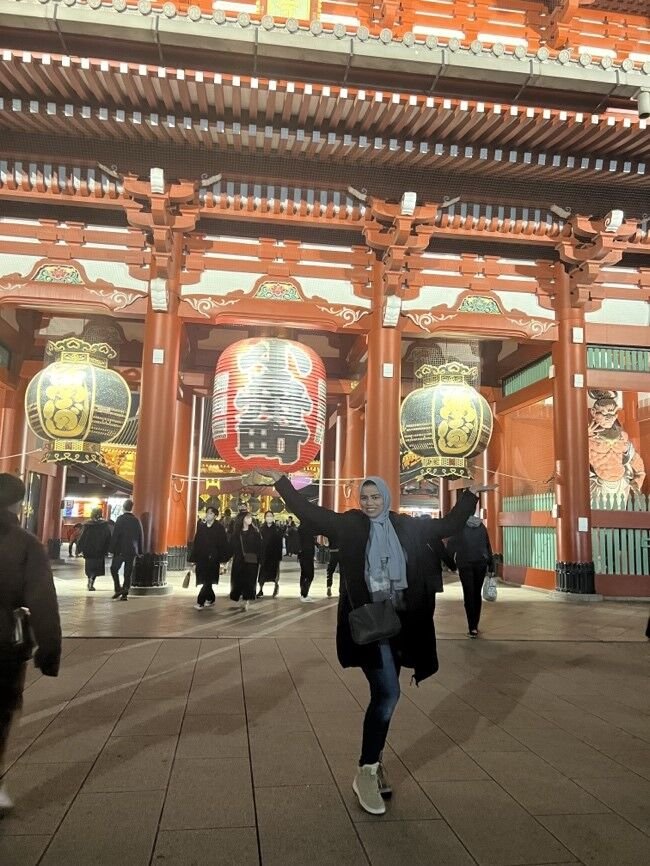Lab visit in Japan to learn more about the complexity of Alzheimer's disease
Heba Ali, doctoral student at former department of Biosciences and Nutrition (now department of Medicine Huddinge), Ivan Nalvarte group did a lab visit in the Department of Neuropathology at the Tokyo University. She focuses on neurodegenerative diseases, specifically studying the effect of estrogen signaling in Alzheimer's disease.

Why did I choose The University of Tokyo?
I have always dreamed of visiting and studying at The University of Tokyo (UoT) as it is one of the most prestigious universities in Japan and consistently ranks highly in global university rankings. The University has a well-established reputation for academic excellence and research, and it offers state-of-the-art research facilities and equipment, which are essential for conducting cutting-edge research in neurodegenerative diseases.
What did you do during your lab visit at UoT?
I visited Professor Takeshi Iwatsubo's lab in the Department of Neuropathology, School of Medicine. During my visit, I was fortunate enough to participate in their group meetings and journal club discussions, where we delved into the latest research on Alzheimer's and Parkinson's diseases. It was an enriching experience to engage with the students, as we exchanged ideas and shared our future plans.
The complexity of Alzheimer's disease
One aspect of my visit that left a strong impression on me was the opportunity to observe stained brain sections from individuals who had been diagnosed with Alzheimer's disease. Professor Takeshi Iwatsubo shared with me the clinical perspective of the disease, which deepened my understanding of its devastating impact. His explanation helped me appreciate the complexity of the disease and the challenges that scientists and healthcare professionals face in treating it.
UTokyo Stockholm Trio workshop
In addition to these engaging sessions, I also attended the UTokyo Stockholm Trio workshop, which provided a platform to hear about the latest updates in the field of science, particularly in brain and neurodegenerative diseases. I was grateful for the opportunity to present my ongoing PhD project and receive valuable feedback from the esteemed attendees.
Overall, my time spent with Professor Takeshi Iwatsubo's team and at the UTokyo Stockholm Trio workshop gave me a greater appreciation for the importance of research in the field of neurodegenerative diseases and strengthened my commitment to contributing to this field through my own work.
What was the major differences between working at KI and UoT?
There are a few differences that I noticed between working in a lab at KI and The University of Tokyo.
- Firstly, language abilities may play a role in how effectively one can work in a lab at The University of Tokyo, as Japanese is the primary language spoken there. While English is commonly spoken in both locations, having some proficiency in Japanese may be necessary for effective communication.
- Secondly, there are differences in work culture between the two locations. The Swedish work culture at KI emphasizes a collaborative approach with a flat hierarchy, while the Japanese work culture at The University of Tokyo values teamwork, respect for authority, and attention to detail.
- Lastly, collaboration may be more common at The University of Tokyo due to the presence of researchers from diverse disciplines and backgrounds. This may offer more opportunities for cross-disciplinary research compared to KI, where groups may be more focused on similar research ideas.
What is your impression of Tokyo?
Tokyo is a fascinating and exciting city that offers a unique blend of traditional and modern culture, excellent food, efficient transportation, high-tech innovation, and safety. Despite the language difficulty, Japanese people are very helpful and welcoming, which made my stay more enjoyable.
Do you have any recommendations?
I highly recommend traveling to Japan as it can be an incredibly helpful experience that can lead to valuable network connections. Traveling not only provides a refreshing break from one's research, but it also allows individuals to gain new perspectives and return to their research with renewed energy and enthusiasm.
Don’t miss visiting the famous landmarks such as the Tokyo Skytree, the Imperial Palace, and the Senso-ji Temple. It's also worth exploring the city's bustling streets and neighbourhoods to get a sense of the local culture. Trying Japanese cuisine is a must, as it is a unique and delicious culinary experience. Additionally, Kyoto is a beautiful and historic city with many attractions worth exploring
I particularly remember...
My best memory of my stay was the workshop and the opportunity to meet and collaborate with participants from Karolinska, Stockholm, KTH and the University of Tokyo. The network and support I received during the workshop were invaluable. Additionally, I had the chance to try a delicious coffee at one of the oldest cafés in Kyoto, which was made using a glass jar heated over a burner. The unique preparation method and delicious taste made it a memorable experience."
To what extent have your stay abroad affected you?
My experiences in Tokyo have had a significant impact on me personally. For one, it has reinforced the importance of effective communication in science and how it can positively impact my research output. I now have a renewed focus on improving my communication skills to facilitate collaboration with other researchers and help translate scientific findings into practical applications.
Additionally, living in a foreign country has taught me a lot about adaptability and resilience. Being in a new environment, with different customs and ways of life, has required me to be more open-minded and flexible. I have learned to navigate new systems, communicate with people from different backgrounds, and adjust to cultural differences, all of which have helped me to develop greater independence and self-confidence.
Overall, my experiences in Tokyo have been incredibly enriching and have given me a fresh perspective on both my research and personal life.
What will you bring back to KI?
I am excited to bring back the knowledge, skills, and experiences that I have gained to KI and continue to grow as a researcher and individual.
